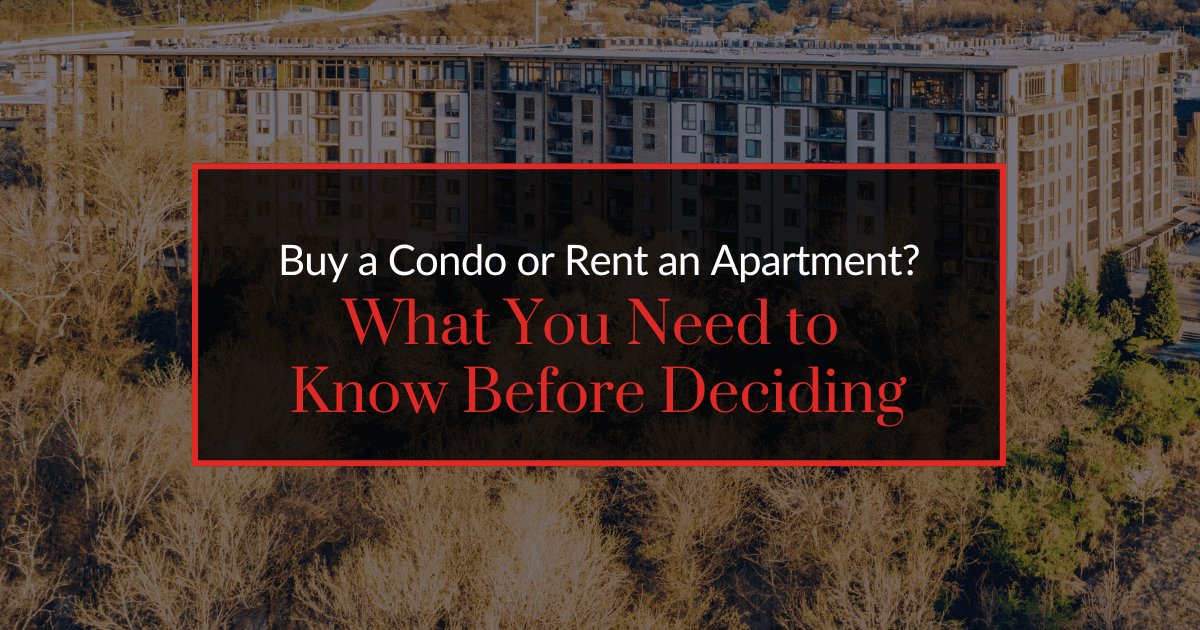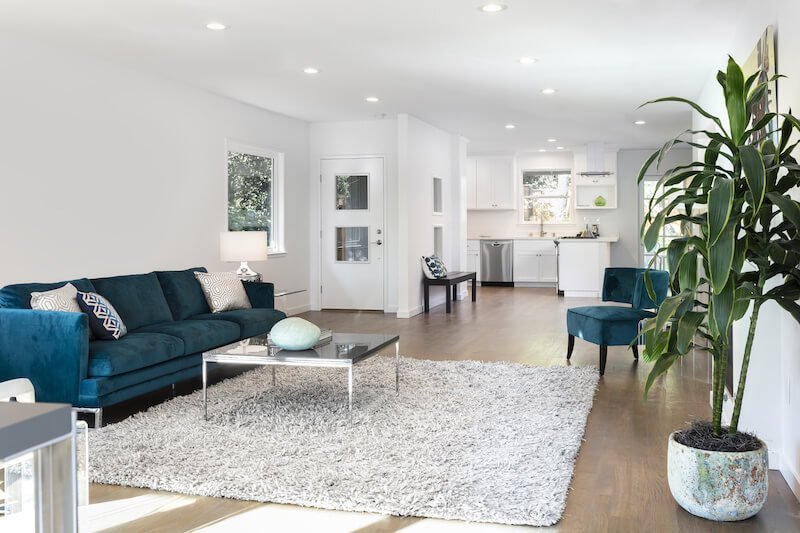Condo vs Apartment: Would Your Rather Own or Rent Your Home?
Posted by Gary Ashton on Thursday, March 28th, 2024 at 8:14am.

From lofts in restored historic buildings to gleaming high-rise condos with amazing views, it's no surprise that the condo lifestyle is in high demand. But is it better to buy or rent a condo to get that experience? Read on and explore the factors below to weigh what may work best for you.
Condos vs Apartments at a Glance
| Condo | Apartment | |
|---|---|---|
| Ownership | Individually owned | Rented or leased from a landlord or property management |
| Maintenance | Owners pay HOA fees for common area and exterior maintenance | Maintenance and repairs are the landlord's responsibility |
| Cost | Owners pay mortgage, HOA fees, and property taxes | Tenants pay monthly rent and possibly utility bills |
| Equity? | Builds equity through monthly payments | Rental payments don't contribute to equity |
What Is a Condo?
A condo, short for condominium, is a type of private residence within a larger building or complex that is independently owned, with shared common areas such as hallways, swimming pools, gyms, and outdoor spaces. Unlike apartments, which are typically leased by their tenants, condos are owned outright, offering the benefits of home ownership along with a communal living experience.
The steps to buying a condo are similar to single-family homes, but the ownership laws are different. This ownership extends to the interior of the unit itself, while the exterior, landscaping, and shared facilities are maintained through a homeowners' association (HOA), to which condo owners pay monthly or yearly fees. Condos are popular in urban settings and vacation destinations due to their affordability and low-maintenance lifestyle, appealing to first-time homebuyers, small families, and those looking to downsize or own a secondary residence.
What Is an Apartment?
An apartment is a residential unit located within a building or complex, offering tenants a space to live that typically includes living areas, bedrooms, a kitchen, and a bathroom. Unlike condominiums, which are owned, apartments are leased or rented from a landlord or property management company, making them a popular choice for those seeking flexibility or without the means for a down payment on a home.
Apartments can vary widely in size, from studio apartments, which combine living and sleeping spaces, to multi-bedroom units. They often come with amenities like laundry facilities, fitness centers, and security services, depending on the complexity of the building. The appeal of apartment living lies in its convenience, often situated in urban centers close to work, entertainment, and dining, as well as its temporary nature, allowing renters the freedom to move without the long-term commitment of property ownership. Unfortunately, renting an apartment doesn't allow you to build equity like condo owners do. However, an apartment may offer rent-to-own agreements that lead to equity later on.
Consider Rent Costs vs. Mortgage Payments
To decide whether it's better to buy or rent a condo, consider the costs of rent vs. mortgage payments. At a glance, renting might seem more affordable, as renters have fewer financial responsibilities than owners. However, the cost of rent still adds up significantly in the long run, especially because rent prices have a tendency to change, and that change is typically upward.
Mortgage payments, on the other hand, are often more stable in that the interest rate is usually fixed. That means payments remain the same throughout the loan repayment period, which in most cases is about 30 years. As a result, owners can easily work out an efficient repayment plan that they'll rely on for the life of the loan, making repayment simpler. Also, unlike rental costs, some mortgage payments are tax-deductible. Generally, mortgage borrowers are eligible for both state and federal tax breaks for cleared mortgage debts up to $750,000.
Those on the fence should consult their Nashville real estate agent to determine the cost difference between renting and buying in the area they're interested in, taking into consideration how long they expect to live there. They might find that homeownership isn't as out of their reach as they thought.
If You Own a Condo, You Can Rent it Out
Another perk of buying vs. renting a condo is that owners can always rent their condo out if it's not their primary residence. In cities with significant tourism potential, owners can be confident of attractive profits from venturing into the world of short-term rentals, and long-term rentals can see steady passive income for many.
Let's take a look at Nashville to see how a vacation rental condo might work out. According to Nashville hospitality research and statistics, Nashville attracts over 16 million visitors annually, and the majority of those who come here stay an average of three to four days and spend roughly $180 per room per night. About 44% of those who visit are often here to see sights and attractions or attend the city's annual festivals, such as the annual Nashville Film Festival, while about 41% come to Nashville for business. What's more, about 91% of visitors report they're likely to come back. These stats indicate the incredible profitability potential of turning a Nashville condo into a vacation rental.
As a bonus, rent payments can be put toward paying down the owner's mortgage. Even if the condo is the owner's primary residence, should they move on, they can hang onto the condo as an investment property.
If You Own a Condo, You Can Build Equity
Even though renting offers the flexibility of moving whenever convenient and means renters are only responsible for their own belongings, rent payments can be compared to throwing money into a void since renters don't see returns at the end of the lease.
When one buys a condo, on the other hand, they build equity with each mortgage payment. For instance, if they spend $5,000 in mortgage payments, they automatically get the same amount in equity. By the end of the mortgage repayment, they'll have built equity they can leverage to renovate the condo, make a down payment for a second property, or make other real estate investments. They'll also have complete ownership over the condo, adding to their portfolio of assets.
If You Own a Rent a Condo, You Can Avoid Homeownership Costs
 Similar to buying, renting has its perks, too, one of the most significant ones being no homeownership costs. As a renter, residents are aware of exactly how much to set aside for the condo each month or during each lease, and should there be changes, the landlord will update renters beforehand. Renters are also only responsible for their belongings, while the condo owner handles overall maintenance costs.
Similar to buying, renting has its perks, too, one of the most significant ones being no homeownership costs. As a renter, residents are aware of exactly how much to set aside for the condo each month or during each lease, and should there be changes, the landlord will update renters beforehand. Renters are also only responsible for their belongings, while the condo owner handles overall maintenance costs.
Renters don't have to stress about home insurance, or monthly utility costs such as sewer management costs, as these are typically handled by the landlord as well. This makes living in a condo a breeze for the renter as they only have to ensure they pay the lease or monthly rent required, while the rest, from maintenance to insurance, is taken care of by the landlord.
Owning a Condo Gives You More Control
When you own a home over renting one, you have a lot more personal freedom regarding how you can decorate it. While you may still have to abide by general rules from a Condo Owner's Association, you'll still be able to customize your home much more than renters can.
For example, many apartment complexes have rules about what can be painted and the colors that can be used, or the types of decor you can put on walls. Meanwhile, if you own your condo, rules will likely only dictate how you can decorate the exterior while giving you free rein over everything inside.
While this may seem like a little thing to some, decor can truly pull a home together and make it feel like your own, but it can be hard to find apartment-friendly decor if your renter's agreement says you aren't allowed to use nails to mount picture frames. In addition, if you own your condo, you can also do remodeling projects like updating your bathroom or replacing old carpet with new hardwood floors. If the floor of an apartment is worn out or looks dingy, you can't really do anything about it other than try cleaning it or strategically positioning your furniture to hide the parts you don't like if the apartment managers don't think it's worth replacing yet.
Rent or Buy a Condo? It's Up to You
While the decision to buy or rent a condo boils down to preferences, purchasing a condo helps owners build equity and expand their asset portfolio. Owners can also renovate and make improvements to personalize and maximize their condo space to their liking. While mortgage payments might be expensive in some instances, owners can always rent out their condo and use the passive income to cover mortgage payments, making it a profitable asset. But renting has its perks, too. For instance, renters can easily pack up and go when their lease is over. Each individual may have a different answer that's best for them.

Gary Ashton
The Ashton Real Estate Group of RE/MAX Advantage
The #1 RE/MAX team in the World!
